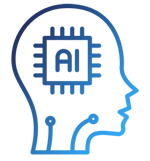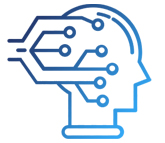- AI

Artificial Intelligence

Smart Products & Services
We follow Smart Products & Services

Intelligent Business Functions & Processes
We follow Intelligent Business Functions & Processes

Robotic Process Automation
We follow Robotic Process Automation

Personalized
healthcareWe follow Personalized healthcare

Identifying at-risk patients
We follow Identifying at-risk patients

Optimized routing and scheduling
We follow Optimized routing and scheduling
- ML

Machine Learning

Predictive
AnalyticsWe follow Predictive Analytics

Service Personalization
We follow Service Personalization

NLP
We follow NLP (Natural Language Processing)

Stock Market Forecasting
We follow Stock Market Forecasting

Fraud Prevention
We follow Fraud Prevention

Recommender engines
We follow Recommender engines
- blockchain
- IOT

Internet of Things
- AR
- Business Solutions

Business Solution

Business Performance Management
We follow Business Performance Management

Decision Making & Big Data Analytics
We follow Decision Making & Big Data Analytics

Enterprise Data Management
We follow Enterprise Data Management
- Apps

Apps

Native Apps
We follow Native Apps

Cross Platform Apps
We follow Cross Platform Apps

Web Apps
We follow Web Apps

Hybrid Apps
We follow Hybrid Apps

Cloud Native Apps
We follow Cloud Native Apps
- Lab

Evolve with the Next-Age BI Strategy with the Best Software House in 2022
The rapid increase in the demand for futuristic solutions has kick-started the road to revolution with the development of next-age technologies like artificial intelligence, blockchain, augmented reality, etc. These tech solutions are changing the perspective of work processes by automating the crucial tasks that humans once did. In today’s world, organisations hire a software house to integrate them into the business model after analysing the company’s goals, objectives and requirements. The once complex operations have turned into smooth implementation, increasing efficiency, transparency, and productivity, leading to increased sales and performance.
Another such strategy is the business intelligence that has evolved with time to help organisations place their brands in one of the niche markets. The business intelligence processes are critical to the growing problem of data collection and storing, where many fail to maintain it and make better decisions. BI emerged to optimise performance by making the utmost use of data in every form at a time like this. Since the world is advancing rapidly, businesses want to make data-driven decisions to avoid losses and increase accuracy throughout the process.
What is a BI Software House?

Businesses developing advanced technologies are always on the lookout for the best ways to implement the strategy effectively. They often hire a software house that researches the company and suggests customised plans that fit the business model. Secondly, they strategise, keeping in mind the company’s goals and requirements and leveraging them to realise the dream. Similarly, a business intelligence agency guides companies with integrating BI strategy while streamlining the plan with requirements. They choose the best solution that will multiple the ROI and enable the business to gain a competitive advantage in less time. But before we move further, it is necessary to delve deeper into the explanation of BI and how it is changing business ethics.
What is Business Intelligence?

Business Intelligence is the next-generation solution to the growing issues of companies related to data and decision making. It is a process of gathering, structuring, analysing and converting raw data into actionable business insights to make better decisions. The strategy uses techniques and tools to transform unstructured data and compile them into small sets or easy-to-understand reports. Many even turn them into information dashboards, leveraging companies to make data-driven decisions.
This business intelligence process is becoming increasingly essential for organisations as they receive data from various internal and external sources in many forms, making it difficult for higher management to analyse and take decisions accurately. There is a history of companies going bankrupt just by making wrong decisions due to inaccurate or lack of data information. Thus, businesses now are on the lookout for valuable data, providing a 360-degree view of the businesses to make wise decisions. Hence, breaking data into chunks to thoroughly analyse it.
The BI software house divides the process into four stages:
- Data Gathering
- Data Cleaning
- Analysing
- Reporting
Is Business Intelligence and Predictive Analysis Connected in Any Way?

Often companies confuse the business intelligence process with predictive analytics, not realising both are two broad terms used for different purposes. Business intelligence is an analytical approach that uses data to process and generate reports for companies making decisions. Moreover, it is called descriptive analytics, enabling companies to research their internal process or the industry’s market conditions. In contrast, predictive analytics forecasts are based on data processing using past events. These forecasts are usually related to future trends that provide opportunities to businesses and alert them of the potential risks. Though BI and predictive analytics are similar in many ways as they use the same techniques to process extensive data, they have different tools. Moreover, predictive analytics is often considered the advanced version of business intelligence.
These analytical approaches fall into three main data management categories:
- Business Intelligence or Descriptive Analytics
- Predictive Analytics
- Prescriptive Analytics
BI and Workflow Automation

Business intelligence and workflow automation combine with an organisation trying to reduce costs while optimising performance. They empower businesses to make the right decision at the right time using the forecasted report and increase productivity in real-time. Business intelligence provides firms with workflow automation solutions that benefit them. Here are a few of the advantages that organisations can enjoy with automation.
- It allows companies to convert raw data into meaningful information or report to analyse and improve critical business areas.
- The workflow automation provides deeper insight into the business to identify the areas that needs better management policies and attention by automating the processes to increase revenue.
- It improves the business processes.
- Higher management can use the information to make better decisions, helping them create advanced strategies.
- Can easily access information or data to change the business landscape.
How to Implement Business Intelligence?

The implementation of BI is easier than other strategies as it can be easily deployed and adjusted according to the organisation’s work ethics or policies. Moreover, the Bi software house requires an in-depth knowledge of the company’s goals and needs to integrate the best tools. The BI tools range from traditional methods to advanced techniques with different advantages. From Crystal Reports to SSRS, a component of Microsoft’s SQL Server’s report and BI tools, businesses can get their hands on any tools that best fit its model.
The Crystal reports let developers design and deliver reports virtually from various data sources. Further, its business intelligence processes leverage companies to choose from multiple reporting formats that make the most sense. Another powerful tool has to be Telerik, which is used for web and cloud computing. It generates comprehensive reports and explains the data quickly, which would have been hard to understand with the raw data. The last is the SQL Server Reporting Service, an MS Visual Studio that explicitly provides BI solutions to industries worldwide.
In a Nutshell
Business intelligence opens the doors of global opportunities for organisations trying to gain a competitive edge with intelligent solutions that automate business workflows. Companies hire a software house that helps implement robust BI strategies, optimising productivity and performance by improving decision-making. Lastly, the industries can effectively identify the flawed operations and make strategies that eradicate issues related to them, making it one of the best futuristic solutions.



















































Leave a Reply